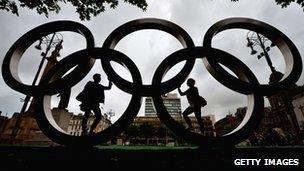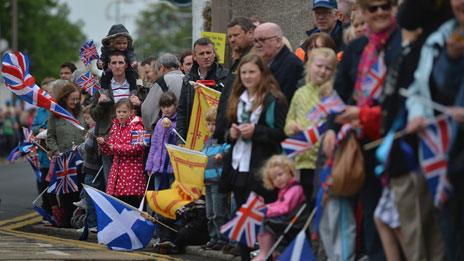Going for the happiness gold
- Published

Glasgow is the host city for several of the Olympic football matches
I confess. The Olympic torch relay failed to fire my enthusiasm.
That made me all the more astonished at the number of people who went to see it, travelling to do so, often early in the morning. They're still doing so, currently in the English Midlands.
Why? The voices I heard talked of it being 'once-in-a-lifetime'. Something to tell the grandkids.
The torch relay is an event, a happening, the social gathering of communities many of which don't unite round much else these days.
To a curmudgeon like me, it's just a flame, for goodness sake. You can get one of them without leaving your kitchen hob. But this one is provoking a reaction from vast numbers of people who want to be part of something much, much bigger than themselves.
How much is that worth? Well, how about the equivalent of a gift for each of us across the UK, valued at £165?
That's the benchmark figure from which a group of economists are starting, when they try to figure out the value of the happiness that can be generated by the Olympics and Paralympic Games this summer.
Feelgood factor
Oxford Economics consultancy was commissioned by Lloyds Banking Group to look into the economic impact of the Games. They've looked at the build-up since London won the bidding in 2005.
And they're looking beyond the closing ceremony, five years into the future to assess legacy effects.
The construction and tourism impacts could be very significant - £16.5bn in total over 12 years for the whole UK. Scotland could get £1bn of that, some £43m of it in tourism spend by those getting away from the London congestion while the Games are on. (They reckon an uplift of only 1% in those fleeing the country.)
But it's the happiness calculations that caught my eye, drawing on research that's been done on other major sporting events.
The economists reckon that people gain happiness - though you could call it feelgood or wellbeing factor if you prefer - from attending events both sporting and cultural.
You could put a high valuation, for instance, on the feedback from the Cultural Olympiad's concert in Stirling last month, where Venezuela's renowned Simon Bolivar Orchestra performed in the rain.
There's also satisfaction which comes from being a volunteer, or just from national pride.
People feel good to see events that unite, motivate children, leave a legacy of sports, or promote awareness of disability.
Northern soul
A study carried out for the UK government in 2005 across London, Manchester and Glasgow found Londoners willing to pay £22 per household to host the 2012 Games, while to the north, the valuation was put at £12. In the northern cities, the intangible benefits, of feelgood factor, were rated more highly than the tangible ones of, say, increased tourist spending.
The £165 calculation - which has a necessarily joy-killing economic sound to it - comes from the 1996 European football championships in England.
Economists reckoned the uplift in happiness at that time was equivalent to 60% of the increase in wellbeing people tend to experience when they cross the line of median income, from the third income quartile into the second one.
So that £165 gift is the benchmark. The challenge is to see how much more value can be placed on an event that's so much bigger than the Euros.
Good time Germans
Of course, some people can feel unhappy about increased disruption to normal life, security concerns, more traffic congestion and the environmental impact of big events. All that and TV schedules gone haywire.
In 2006, the FIFA World Cup in Germany tackled that with big police numbers, but restraint in their presence, setting environmental targets as part of the tournament while investing in transport improvements, and they tied in increased sporting and voluntary activity.
The result, said two German academic researchers: an event that took a sporting event to a different level "at which a country and its people, through their abilities, culture and temperament, strove to give the guests, the TV viewers abroad and themselves a good time".
Does the feelgood factor lead to a boost in consumer confidence, and therefore a tangible economic effect? The Oxford Economics team report the evidence is mixed. In some cases, the happiness boost is short-lived.
In the English case in 1996 and France's FIFA World Cup two years later, there was a boost over the preceding 12 months. But when Belgium co-hosted the European championships, it had a negative impact.
The other key question: how much does happiness depend on the medals table? The Oxford Economics report reckons the 47-medal haul at the Beijing Olympics set a high bar. An academic study linking Olympic performance to gross domestic product per head reckons that the UK should be in the 42 to 47 medal range.
If Team GB falls short of expectations, what happens to the happiness factor then? Is that £165 gift given back in disgust?
And of course, what happens to happiness if it keeps raining?
- Published3 July 2012
